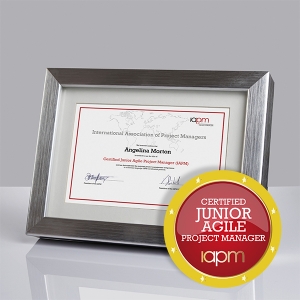New Agile Certification: Certified Junior Agile PM
 26.10.2017 -
Even though the year is drawing to a close, we are still stepping on the gas. In recent months, we have developed a new Agile project management certification programme, the Cert. Junior Agile Project Manager (IAPM), which can be taken with immediate effect.
26.10.2017 -
Even though the year is drawing to a close, we are still stepping on the gas. In recent months, we have developed a new Agile project management certification programme, the Cert. Junior Agile Project Manager (IAPM), which can be taken with immediate effect.This certification programme is a logical extension of our existing portfolio of programmes, such as the Cert. Junior Project Manager (IAPM), which is primarily aimed at novice project managers, students, entry-level professionals and young professionals.
The certification programme is a perfect way for aspiring project managers, who would prefer to work in an Agile project environment, to lay the foundations as they start a career in Agile project management and acquire knowledge of the Scrum methodology through IAPM certification which is recognised and well-respected around the globe. Once the course has been successfully completed, the certification is permanently valid and there are no re-certification costs and requirements. This applies to all certification programmes offered by IAPM.
A basic understanding of Agile and Scrum methodologies are tested in the Junior Agile Project Manager (IAPM) certification examination, whereas additional subjects such as Extreme Programming and Kanban are tested in the higher level examination, the Cert. Agile Project Manager.
The new basic Agile certification also serves as a good preparation for aspiring Scrum Masters or Product Owners.
Before the examination is taken, each prospective Junior Agile Project Manager (IAPM) has the opportunity to take a preparatory test which is already included in the certification costs. The test enables candidates to test their current level of understanding and to identify any gaps in their knowledge before they take the actual exam. Should candidates feel that they want to gain greater confidence before they sit the examination, they can consolidate their knowledge by studying independently or by attending seminars that will help them to prepare for questions and deepen their knowledge of Scrum and Agile project management. We recommend that candidates read the Agile PM Guide 2.0 published by the IAPM.
Candidates will have to answer 40 questions in 35 minutes in the exam. At least 65% of the questions on the paper must be answered correctly to pass the exam and for candidates to be awarded certification as an IAPM certified Junior Agile Project Manger (IAPM).
It is not necessary to have any professional experience or any in-depth prior knowledge to sit the examination. Candidates will be awarded certification from an accredited global organisation. After going on to deepen their knowledge and gain more professional experience, candidates can build on this qualification by working towards certification as a Cert. Agile Project Manager (IAPM) or Cert. Senior Agile Project Manager (IAPM).
The main benefits of working towards IAPM certification include flexibility in terms of the time and location the examinations are taken and a fair pricing policy for the certification programme which is dependent on the GDP of the candidate’s country of residence. When applying for jobs, certification holders stand out from their competitors and increase their chances of entering the profession.
You will find here further information on the Cert. Junior Agile Project Manager (IAPM) certification.
You can register for the certification programme here.
« Back to overview
